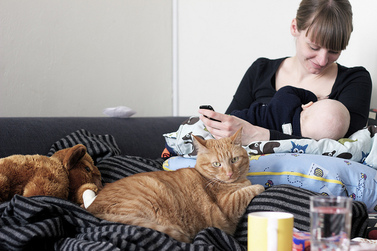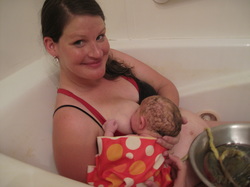| I knew I would breastfeed from the moment I found out I was pregnant. I knew it would be hard because we lived in a foreign country where we did not speak the native language, but I knew I could learn everything I needed to. My husband would support and encourage me. I was going to make this happen. I read every breastfeeding book I could get my hands on and even arranged for a doula in another town to travel to my city to teach a breastfeeding class. I watched video after video about pumping and latching. |
I bought breast shells to help my inverted nipples and ordered nipple shields just in case. I was ready and so was my husband. It was going to be amazing, I just knew it.
Then my son arrived. We spent almost thirty minutes helping him latch and that would be the only time he would nurse for the first 24 hours of his life. My inverted nipples were not cooperating and my baby had my husband’s small mouth. The nurses tried and tried but none of them could get him latched. In a panic, I called another expat I had met just a week before and she graciously came to help. She got Lucas latched and then showed me how to use my pump and syringe feed him so that we didn’t have to use a bottle. Within a few days Lucas was latching like a champ and my milk had come in. I had done it! I was breastfeeding exclusively and everything was perfect. I felt like a good mom who had accomplished a major feat and I knew my baby was getting the very best thing I could give him.
Then about a week and a half after my son was born, I started to experience something unusual. Every time I nursed(which was pretty much constantly), I would get really sad, angry, and anxious. I would repulsed and resentful. I would cringe when he cried and I couldn’t wait for it to be over. I dreaded the next time I would have to feed him. I confided in the friend who had helped me get Lucas latching and she said it was normal to feel overwhelmed during a growth spurt. I appreciated her encouragement but the feelings were getting worse and I couldn’t believe this was normal.
I began to hate holding my son and I felt nothing maternal or loving when I fed him. I felt angry and full of hate and I spent my days crying alone because I was too ashamed to admit to anyone how I was feeling. I eventually confided in my best friend because I knew she would not be judgemental. She told me that what I was experiencing didn't sound normal at all and that I should talk with my husband and research my options. I told her I didn’t want to breastfeed him anymore and she told me that was ok. But it didn’t feel ok. This is what is best for him. This is what is natural. This is what I am supposed to do for him.
I scoured the breastfeeding books for an answer and none of them described the problems I was having. I still had not talked to my husband because I wanted to have some kind of explanation other than, “I’m a terrible mother.” Finally I resorted to google. I searched “breastfeeding causes depression” and the results were startling. I expected to find nothing. I expected Google to confirm my fears and tell me I was just awful and selfish, but instead it confirmed that I was not alone. I read story after story of women who experienced exactly what I was.
I was suffering from a condition called D-MER (Dysphoric Milk Ejection Reflex). Basically, when a woman hasD-MER, herDopamine levels plummet when she experiences milk letdown. So instead of feeling happy, in love, and relaxed you feel anxious, angry, depressed, and sometimes queasy. Severity of this condition varies and some women feel much better once they have a name and answer for what they’re feeling. They understand it and therefore are able to continue nursing. Some women (like me) experience more severe symptoms and begin to resent their baby, feel hopeless, isolated, and angry.
In America, these women have access to a variety of treatment options including medications in some cases. Unfortunately in Korea they had never heard of the condition and therefore were unable to help me. My husband and I went to four different doctors the day after I did my research. We saw a Pediatrician, an Obstetrician, a Lactation Consultant, and a Psychologist. All of them told me I had the baby blues but we knew that was not what I was experiencing. While we walked home we talked about our options and made the decision to wean our son. It was literally the hardest decision I have made as his mother thus far. I felt incredibly guilty and ashamed. I was afraid for people to find out. I was afraid of experiencing their judgement, and I did experience that quite a bit. People called me selfish and said that if you’re not ready to sacrifice for your child, then you should not be a parent.
The things people said to me were cruel and hurtful and in the end completely false. I was not selfish. I had made the best decision I could for my family in the circumstances we found ourselves. I could give my son all the breastmilk in the world but if I was that emotionally unwell, I would not be a good mother. He would not get the care and love he needed and deserved.
D-MER is a real condition and it affects mothers every day. If you have found yourself suffering these feelings, please know that you are not a bad mother, you are not selfish, and you are not crazy. You are experiencing a physiological response that you cannot control at all. Please know that there is support available. You are not alone and in America you have so many resources available. For more information on D-MER, its symptoms, its treatments, and what causes it please visit http://d-mer.org/.
Then my son arrived. We spent almost thirty minutes helping him latch and that would be the only time he would nurse for the first 24 hours of his life. My inverted nipples were not cooperating and my baby had my husband’s small mouth. The nurses tried and tried but none of them could get him latched. In a panic, I called another expat I had met just a week before and she graciously came to help. She got Lucas latched and then showed me how to use my pump and syringe feed him so that we didn’t have to use a bottle. Within a few days Lucas was latching like a champ and my milk had come in. I had done it! I was breastfeeding exclusively and everything was perfect. I felt like a good mom who had accomplished a major feat and I knew my baby was getting the very best thing I could give him.
Then about a week and a half after my son was born, I started to experience something unusual. Every time I nursed(which was pretty much constantly), I would get really sad, angry, and anxious. I would repulsed and resentful. I would cringe when he cried and I couldn’t wait for it to be over. I dreaded the next time I would have to feed him. I confided in the friend who had helped me get Lucas latching and she said it was normal to feel overwhelmed during a growth spurt. I appreciated her encouragement but the feelings were getting worse and I couldn’t believe this was normal.
I began to hate holding my son and I felt nothing maternal or loving when I fed him. I felt angry and full of hate and I spent my days crying alone because I was too ashamed to admit to anyone how I was feeling. I eventually confided in my best friend because I knew she would not be judgemental. She told me that what I was experiencing didn't sound normal at all and that I should talk with my husband and research my options. I told her I didn’t want to breastfeed him anymore and she told me that was ok. But it didn’t feel ok. This is what is best for him. This is what is natural. This is what I am supposed to do for him.
I scoured the breastfeeding books for an answer and none of them described the problems I was having. I still had not talked to my husband because I wanted to have some kind of explanation other than, “I’m a terrible mother.” Finally I resorted to google. I searched “breastfeeding causes depression” and the results were startling. I expected to find nothing. I expected Google to confirm my fears and tell me I was just awful and selfish, but instead it confirmed that I was not alone. I read story after story of women who experienced exactly what I was.
I was suffering from a condition called D-MER (Dysphoric Milk Ejection Reflex). Basically, when a woman hasD-MER, herDopamine levels plummet when she experiences milk letdown. So instead of feeling happy, in love, and relaxed you feel anxious, angry, depressed, and sometimes queasy. Severity of this condition varies and some women feel much better once they have a name and answer for what they’re feeling. They understand it and therefore are able to continue nursing. Some women (like me) experience more severe symptoms and begin to resent their baby, feel hopeless, isolated, and angry.
In America, these women have access to a variety of treatment options including medications in some cases. Unfortunately in Korea they had never heard of the condition and therefore were unable to help me. My husband and I went to four different doctors the day after I did my research. We saw a Pediatrician, an Obstetrician, a Lactation Consultant, and a Psychologist. All of them told me I had the baby blues but we knew that was not what I was experiencing. While we walked home we talked about our options and made the decision to wean our son. It was literally the hardest decision I have made as his mother thus far. I felt incredibly guilty and ashamed. I was afraid for people to find out. I was afraid of experiencing their judgement, and I did experience that quite a bit. People called me selfish and said that if you’re not ready to sacrifice for your child, then you should not be a parent.
The things people said to me were cruel and hurtful and in the end completely false. I was not selfish. I had made the best decision I could for my family in the circumstances we found ourselves. I could give my son all the breastmilk in the world but if I was that emotionally unwell, I would not be a good mother. He would not get the care and love he needed and deserved.
D-MER is a real condition and it affects mothers every day. If you have found yourself suffering these feelings, please know that you are not a bad mother, you are not selfish, and you are not crazy. You are experiencing a physiological response that you cannot control at all. Please know that there is support available. You are not alone and in America you have so many resources available. For more information on D-MER, its symptoms, its treatments, and what causes it please visit http://d-mer.org/.



 RSS Feed
RSS Feed
